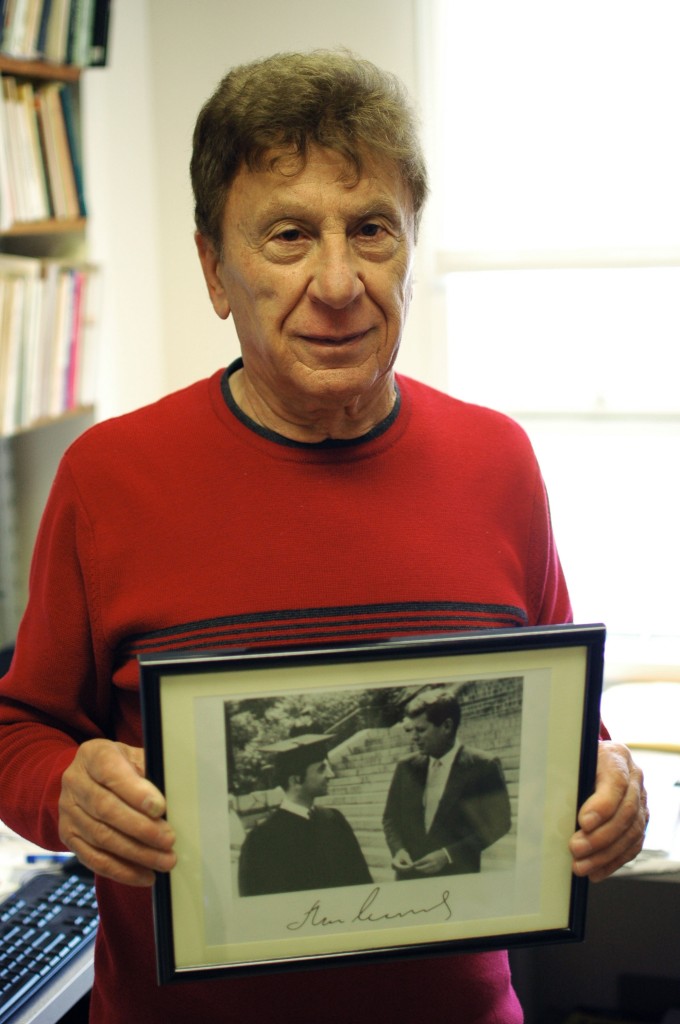
Surrounded by stacks of papers and walls of novels and reference books, professor of French and comparative literature Sandro Sticca’s academic environment seems to consume his slight frame.
Sticca was born in Italy and moved to the United States just after he finished high school. He knew almost no English, but studied Greek, Latin and French growing up. Before college, Sticca was drafted by the U.S. Army to serve during World War II.
“I was a riot since I didn’t know the language,” Sticca said. “They would tell me I had basic training at two o’clock, and I’d come out with a broom instead of a rifle.”
After his service, he enrolled at Syracuse University and was determined to become an English professor despite his limited grasp of the language. Ignoring doubts from the department, Sticca graduated Magna Cum Laude in 1957 with a degree in English literature after three years.
“I find that I can say more things in English than I can in Romance languages,” Sticca said. “English has 750,000 words, French only has 350,000. You can express yourself and say more. It lends itself to being spoken, to communication. I learned it as a second language, to me it is sacred.”
President John F. Kennedy was campaigning at the time and spoke at the commencement ceremony.
“He spoke about the future, and told us to be all that you could possibly be,” Sticca said. “He told us, ‘When all is done and you go out into the world, the only thing that counts is what you leave here’ and pointed to the library.”
Sticca was given the opportunity to speak with Kennedy personally, describing their communication as “effortless,” saying, “It was as if Cicero was standing in front of me.”
The two took a photo, which Kennedy later signed. Sticca’s passion for the English language impressed Kennedy, and the two kept up a correspondence over several months. Kennedy’s secretary invited Sticca to have breakfast with the president once he returned from Dallas in 1963.
“But of course, tragically, he never returned [from that trip],” Sticca said through tears.
Sticca frequently receives offers to buy his autographed photo, which he says he finds disturbing.
“It has such an unimaginable value, that the meaning will last me a lifetime,” Sticca said. “I have to make a pilgrimage, like Chaucer’s from London to Canterbury, and visit Arlington to see where he is buried.”
After receiving his Ph.D. from Columbia University, Sticca achieved his dream of becoming a professor. He also followed Kennedy’s advice, leaving his mark on libraries everywhere by publishing over 46 books.
“When a topic interests me, I must study it,” Sticca said. “Then I’ll write about it in English or Italian or French.”
In the 1980s, Sticca became the first American to be knighted into the Order of the Knights Templar in Italy.
“I was honored for my general contribution to knowledge,” Sticca said, “but also for furthering the cause of the Italian language.”
Sticca emphasized the importance of the relationships professors build with students, saying that the encounters are mutually beneficial.
“I think unless you are active as a professor, you give nothing,” Sticca said. “If you don’t give something of your own to the students, what is the difference between you and a book?”
Sticca said he encourages his students to never lose their individuality and creativity.
“The human soul is so beautiful, and can imagine so many things,” Sticca said. “Those with an imagination went to the moon before man actually walked on it.“
In light of his accomplishments, Sticca offered advice to students for how to leave their marks by capitalizing on their talents and interests.
“Always ask yourself what you can contribute,” Sticca said. “You have to follow what nature suggests for you and what you want to be. Order, discipline and intellectual preference are the secrets. If you don’t like something, there is no use knocking on the door because your mind will reject it.”


